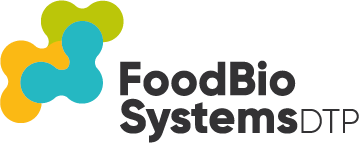Doctoral researchers at University of Reading
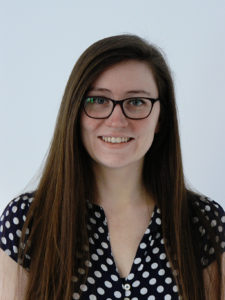
Kirstin Ayris
2021-25 cohort
Project title: Responsible innovation of autonomous robots in agriculture: towards more substantive inclusion and user-centred design
Co-supervised at: Cranfield University
What is your project about ?
My project focusses on how we can create more substantive inclusion in deciding what a future sustainable agricultural sector might look like. In particular, I am interested in the democratisation of the design and development of new science and technology for the farming sector, focussing particularly on autonomous robots for agriculture. I will be investigating what kind of creative participatory approaches we can use to substantively involve more people – from farmers, to technology businesses, to the general public – in discussions of what agricultural technology futures should look like in the UK.
What led you to doing a PhD?
I decided to do a PhD following my studies for an MSc in Sustainable Development at the University of Sussex. I have a deep interest in how our food systems work, and throughout my MSc, I focussed on questions of democratisation, food justice, and agricultural development. Studying for a PhD has allowed me to continue researching this fascinating area, and also gives me the opportunity to contribute to real, sustainable development in the incredibly important agricultural sector.
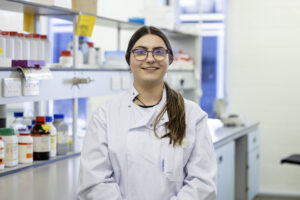
Chloe Callow
2021-25 cohort
Project title: Mechanistic understanding of zinc-iron interactions in piglets – finding an alternative to zinc oxide at weaning
Co-supervised at: University of Surrey
What is your project about ?
My project is aimed towards using lower iron supplementation as an alternative to zinc oxide during piglet weaning. I will be understanding the consequences of altering the diet on the piglets immune development and bacterial colonisation within the gut.
What led you to doing a PhD?
I have always had a passion for research and discovering new things back when I was doing my BSc in biological sciences at UEA, I stayed there for a Masters by research in biomolecular science. After that I wanted to progress my skills further in a broader subject.
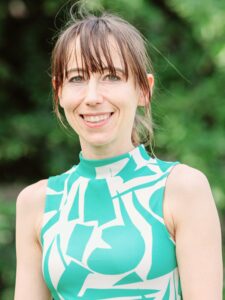
Agnieszka Carvalho
2022-26 cohort
Project title: Development of novel platform for targeting animal parasites
Co-supervised at: University of Surrey
What is your project about?
Haemonchus contortus and Teladorsagia circumcincta, two of the most significant sheep parasites, constitute a major threat to UK food security, whilst widespread multi-drug resistance creates an urgent need for the development of novel treatment strategies. This research aims to develop Nuclear Hormone Receptors, proteins that govern reproduction, metabolism and development as novel drug targets of anti-parasitic agents.
What have you enjoyed most about DTP training so far?
The FoodBioSystems DTP presented me with a fantastic training opportunity, which helped me develop my logistical, analytic and coding skills, whilst annual summer school allowed me to experience working within inter-disciplinary team. This has allowed me to develop a set of skills which, alongside my PhD research, will make me much more employable in the future.
What challenges have you met so far in your project? And how did you overcome them?
As I don’t have a CASE studentship/ Industry funding, I was worried about finding a Professional Internship placement. I approached a few companies in the local area who I was interested in working with; however, they were not keen on supervising someone for just three months. At the end of my second year I listed all skills I developed throughout DTP training and my research and started to apply for national Professional Internships for PhD students (PIPs). Thanks to the guidance from the DTP team and supported by my skill set developed throughout the DTP training programme, I have secured a prestigious placement spot.
What are you looking forward to doing next in your project?
I am about to start my placement, which I am really looking forward to. It will be great opportunity for professional development and networking. Upon my return from placement, I will focus on collecting more data for my project and hopefully publishing the results.
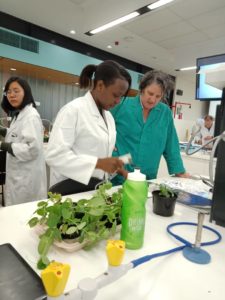
Arisede Chisaka
2021-25 cohort
Project title: Addressing the challenge of combined heat and drought stress for cereal production
Co-supervised at: Aberystwyth University
This is a CASE studentship and the project is supported by an industrial partner.
What is your project about ?
Drought currently restricts global cereal production, and the situation is projected to worsen with climate change. Past studies have identified that plants respond to drought with stomatal closure. A downside of this drought response is that drought often co-occurs with heat waves. In our rapidly warming world, crop producers cannot rely on stomatal closure which sacrifices cooling ability and increases susceptibility to heat stress. This project will explore novel compounds that confer drought tolerance while avoiding increased susceptibility to heat stress.
Why did you chose the FoodBioSystems DTP over other PhD opportunities?
The FoodBioSystems DTP offered the opportunity to equip myself for an onward career in scientific research in a university or industry setting. Their incredible training opportunities will develop my skills in a wide range of highly desirable areas where funders have identified the UK and international skill deficits. Also, it gave me a rare opportunity to work closely with an agriculture company, Aberystwyth, and Reading which will allow me to access advanced plant phenotyping infrastructure at all institutions to conduct research with real-world impact.
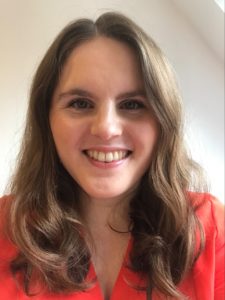
Vicky Gerrard
2020-24 cohort
Project title: Investigation into sustainability labelling of food and implications for the consumer and the food industry
Co-supervised at: Queen’s University Belfast
What is your project about and why is it relevant to the UK food system?
My project aims to develop a new label that communicates to the consumer how sustainable a food product is. This could improve the sustainability of the UK food system in 2 ways; by increasing consumer demand for sustainable food and by incentivising the food industry to improve the sustainability of their products.
What have you enjoyed most about your DTP training so far and what are you looking forward to doing next in your project?
I enjoyed the training on food systems as it showed me the importance of taking a step back from your work to consider implications on other parts of the food system. All components of the food system are connected, so when solving one issue in the food system, we need to understand these connections to avoid unacceptable trade-offs.
I’m looking forward to working with consumers to design prototypes for the new label and learning about which aspects of sustainability are important to them.
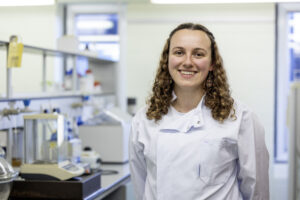
Holly Giles
2022-26 cohort
Project title: WheyBetter: A fundamental approach to redesigning whey protein isolates to step change their oral performance, leading to protein fortified products that will enable muscle mass maintenance over lifecourse
Co-supervised at: Aberystwyth University
Why is your project important to or how is it relevant to the UK food system?
Foods fortified with whey protein are commonly rejected by older adults due to negative tastes and textures. This project aims to increase increasing understanding of whey protein’s structure, leading to improvements in its texture; it is hoped that with these changes older adults will accept fortified foods and increase their protein consumption.
What have you enjoyed most about DTP training so far?
The DTP training gives you a chance to develop a range of skills, outside of your specific project. I was new to food science before my PhD so this has helped my understanding of the food system and knowing where my research fits into this bigger picture. I’ve also enjoyed getting to know other PhD students through the training, giving us a community of people all going through the same experience!
What are you looking forward to doing next in your project?
As I pass the 18-month mark I am looking forward to becoming more independent as a researcher in planning my next series of experiments and developing new techniques in the lab.

Ely Jewett
2020-24 cohort
Project title: The impact of food transmitted microplastics and endocrine disruptors on animal and human health
Co-supervised at: Queen’s University Belfast
What is your PhD about and why is it important?
Microplastics are prevalent though all ecosystems, meaning that they are present within our food (plants and meat) and drinking water. We currently know that they can cause defects in fertility, however we do not know the mechanism by which this happens.
How have you found your PhD so far?
Beginning my project during a pandemic certainly wasn’t easy as we could not start lab work straight away. however, this became a benefit as it gave me time to read all the literature surrounding my project and to write a review about this. this made sure that by the time I entered the lab I knew my topic well and understood where I could take my project as I progressed.
What are you looking forward to doing next in your project?
I am looking forward to visiting my co-supervisors and traveling to other universities for training so that I can build up relationships with other scientists not within my university and understand the food system from other angles.

Samantha Kehoe
2022-26 cohort
Project title: Anaerobic fermentation of food waste to connect fork to farm and store carbon in soils
Co-supervised at: University of Aberystwyth Industry Partner: Agriton Ltd.
Why is your project important to or how is it relevant to the UK food system?
This project hopes to investigate fermentation as a way to get more nutrients out of the bin and back into the fields, whilst possible storing carbon in soils. If scalable, this system could potentially reduce GHG emissions and make a good soil amendment – so we need to find out whether fermenting food waste is something we should do and could do.
What have you enjoyed most about DTP training so far?
The best part so far is getting to meet and network with such a variety of people from different fields of expertise on such a wide variety of projects.
What are you looking forward to doing next in your project?
I am looking forward to moving from very controlled lab-based work to working with real food waste produced on campus and scaling up to see how our lab results compare to the real thing – and if they are different, digging into what that says about scalability of the process.
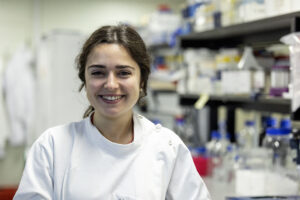
Patricia Sanz Morales
2021-25 cohort
Project title: A human intervention study using Human Milk Oligosaccharides (HMOs) to improve Irritable Bowel Syndrome (IBS) symptoms through targeting of the gut microbiota.
Co-supervised at: University of Surrey
I have a CASE studentship and the project is in collaboration with a partner from the food industry.
What is your project about ?
I am investigating the potential role of HMOs to modulate the gut microbiota and relieve IBS symptoms, starting with in vitro work which will lead on to a human trial with 60 IBS patients. I have a CASE studentship and the project is in collaboration with a partner from the food industry.
What led you to doing a PhD with the FoodBioSystems DTP?
After completing my MSc in Nutrition and working as a clinical nutritionist, I realised research was my true calling. I found the FoodBioSystems DTP the most complete and purposed PhD programme, with many training opportunities besides my specific area of research.
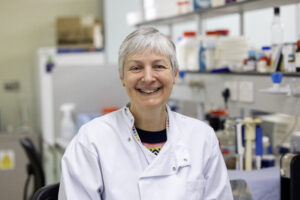
Susan Rudlin
2022-26 cohort
Project title: Cricket Power: Protein for the Future
Co-supervised at: University of Surrey
What is your project about ?
We need to produce protein in a sustainable way for a growing population and house crickets could be the solution. They contain a lot of protein, suitable for our needs, but there is some resistance to including whole insects in our diets. Finding ways to incorporate this protein into delicious products may be key to wider consumer acceptance and that’s what our work is looking at.
What have you enjoyed most about DTP training so far?
We’ve had a chance to get to grips with how difficult it is to create even simple change in the food system, there are so many interested parties all acting from different viewpoints. Knowing there are tools that help you navigate this has been really useful.
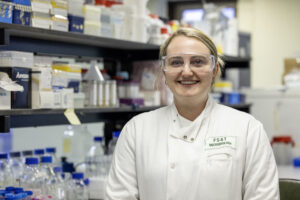
Hannah Thomas
2021-25 cohort
Project title: Investigating the impact of the common food ingredient (Carrageenan) on the human gut microbiota.
Co-supervised at: Aberystwyth University
I have a CASE studentship and the project is supported by a food ingredient company.
What is your project about ?
Carrageenan is extracted from red seaweeds and utilised broadly throughout the food industry as an emulsifier, texturiser, and thickener. My project is investigating whether carrageenan is impacting the human gut microbiota through using in vitro lab techniques followed by the development of a food product to use in a human trial.
Why did you chose the FoodBioSystems DTP over other PhD opportunities?
Before deciding to do a PhD, I worked in a research facility. Although I thoroughly enjoyed working in a research environment, I wanted to have more control over my research. The FoodBioSystems DTP allowed me to research a topic which I was interested as well as access all the additional opportunities such as working with industrial partners and attending summer school.
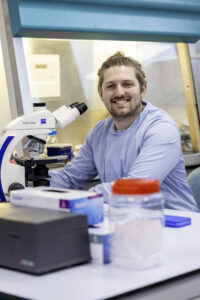
Callum Wilkinson
2022-26 cohort
Project title: A New Approach to the Production of Cultured Meat with Enhanced Texture
Co-supervised at: Aberystwyth University. I have a CASE studentship and the project is supported by Cellular Agriculture.
What is your project about ?
Cultured (lab grown) meat shows remarkable promise in improving the environmental impacts of meat production and ensuring food security and independence. Making cultured meat closer to traditional meat taste and sensory profile is an important step to bringing cultured meat to the market.
What have you enjoyed most about DTP training so far?
The summer school was a thoroughly positive experience from both the academic and social view. Getting to meet and hang out with so many other students was fun and the learnt skills and chance to present was especially beneficial for me.
What are you looking forward to doing next in your project?
I’m hoping to get enough data shortly to write a paper. I’m super excited about the prospect of publishing my first paper and can’t wait.
